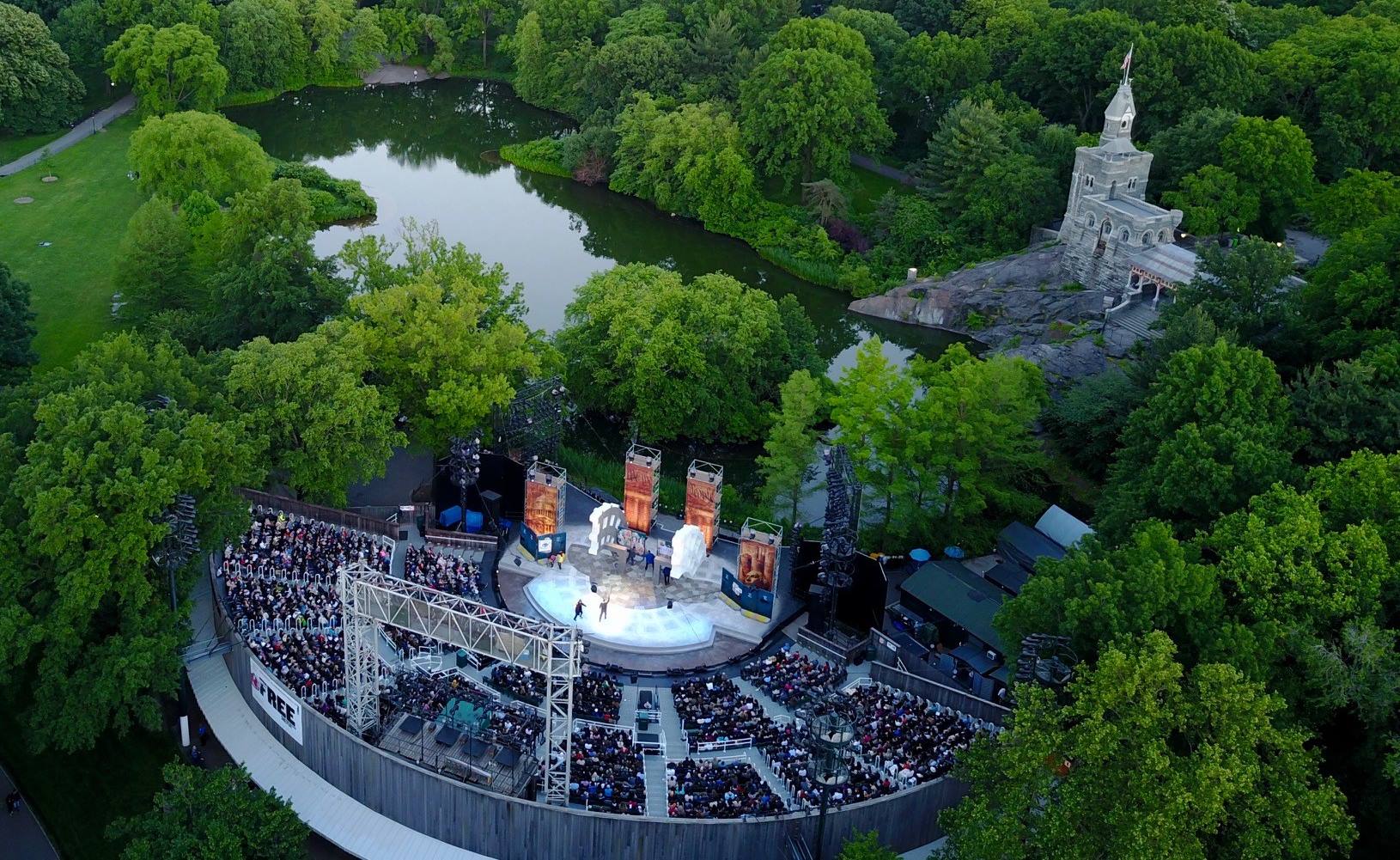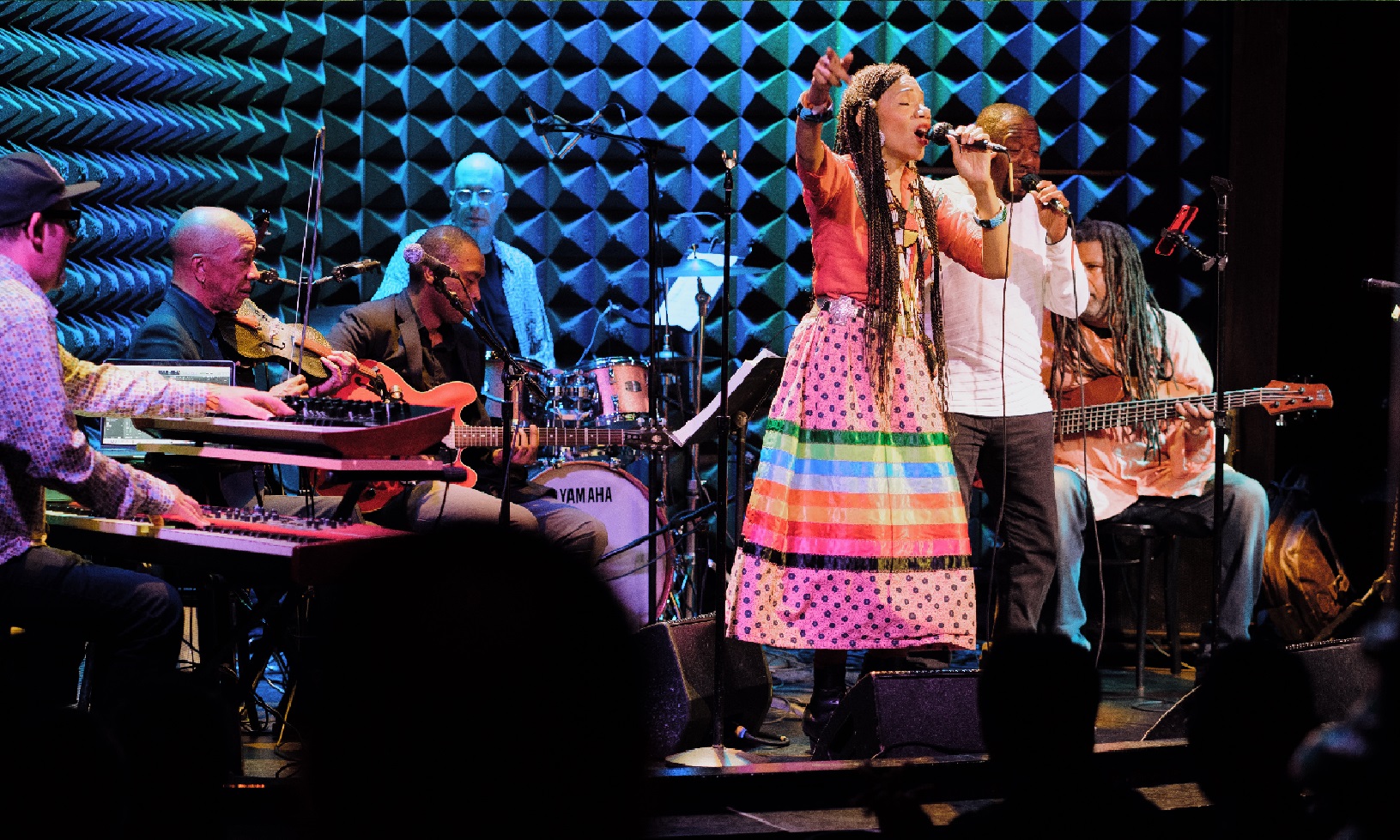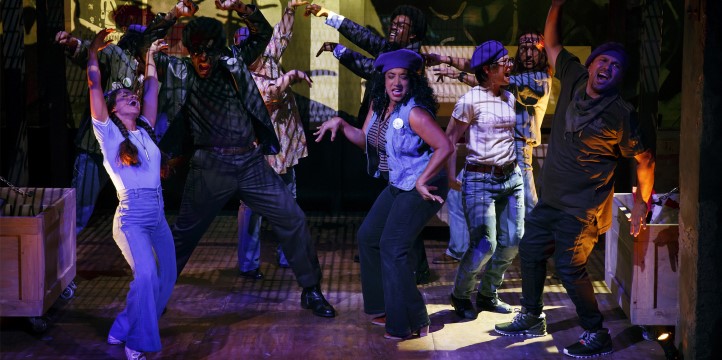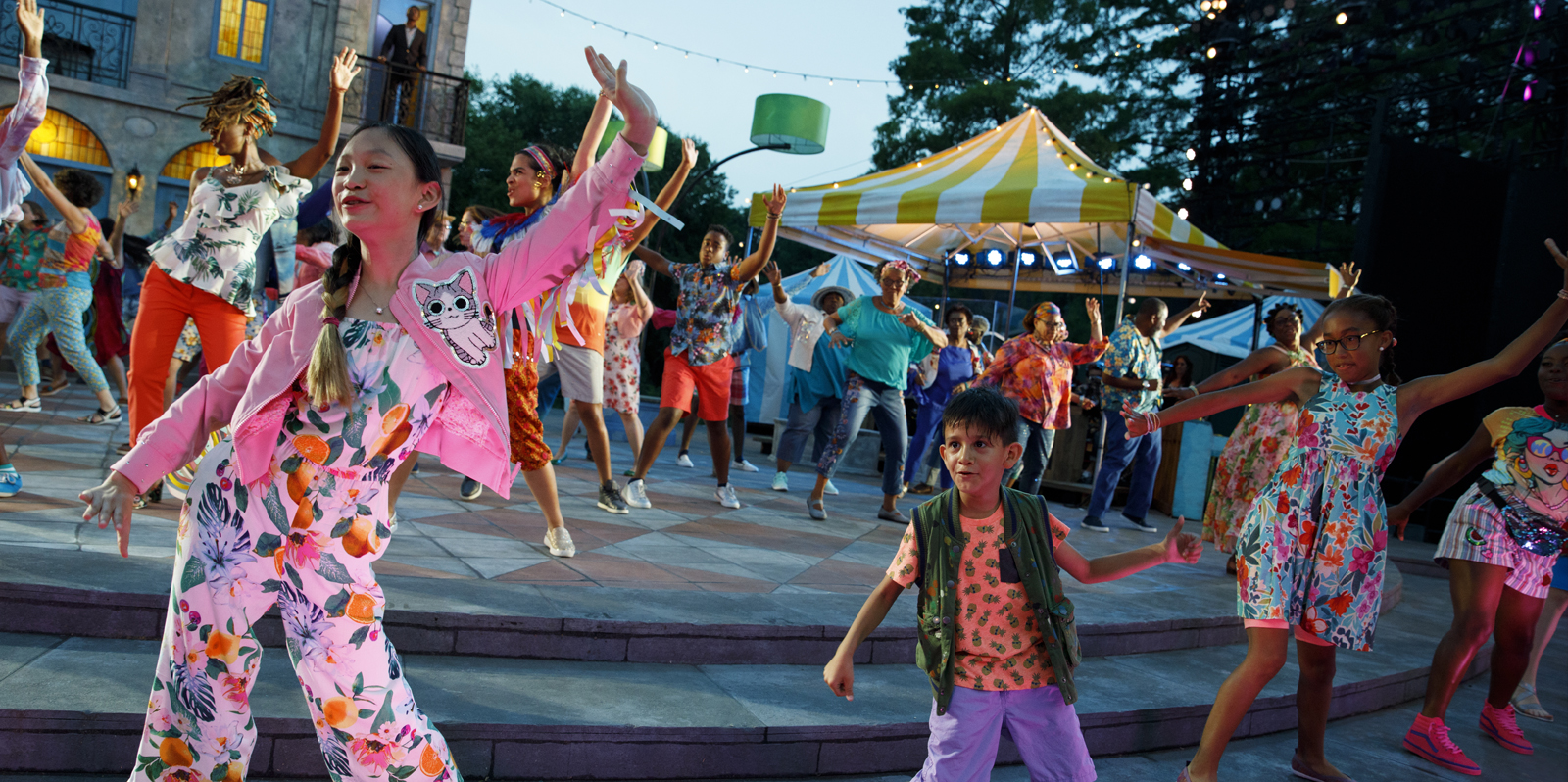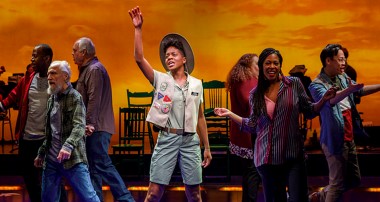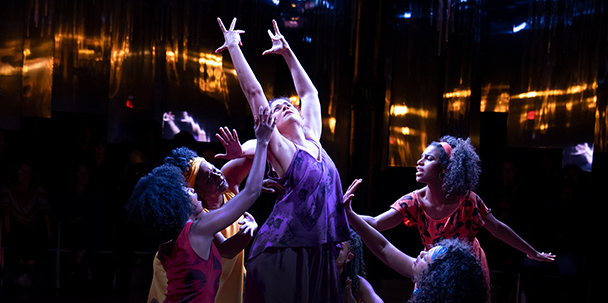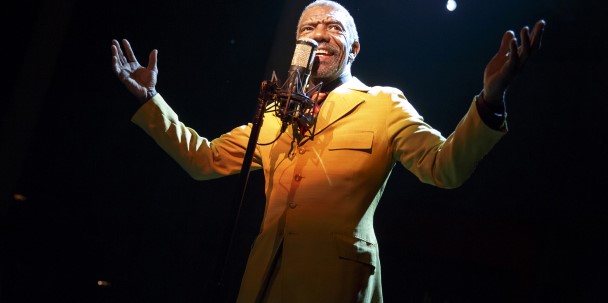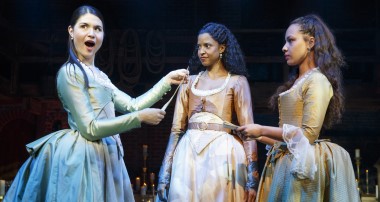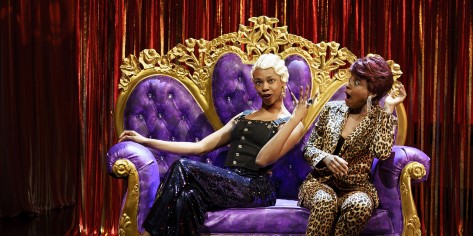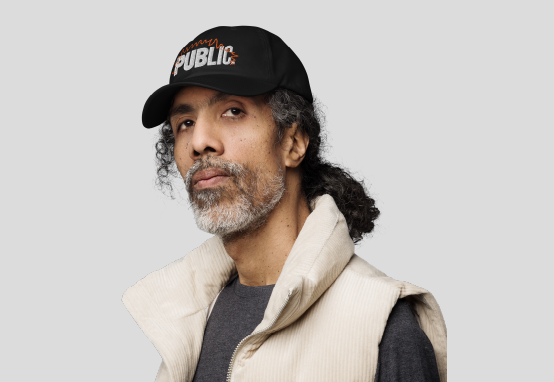Building in Change: A conversation with Rosa Navarrete and the Devised Theater Working Group Cohort of 2023-24
Developing work comes with its ups and downs, especially for many theaters across the nation that are still dealing with the financial hardships due to the pandemic shutdown and fear of infection that have followed in subsequent years. Theaters have struggled to fill seats, and artists have felt the pinch. The Public Theater’s Devised Theater Working Group is no exception. The initial intention of the conversation was to see where the 2023-24 cohort members were in their creative process, and how the work was being uplifted in the production space. What emerged was a cacophony of concern and community care. Each artist expressed their process in the midst of change at The Public. The conversation extended from the origins of their pieces, to self-advocacy around expression, and to newfound discoveries and processes amidst a new group of colleagues.
From the start of our virtual call, I could tell that this collective cared deeply for one another. I witnessed a sharing of resources just moments before we started our time together. It made me reflect on “the struggling artist” archetype—so many years of good artmaking and pain going hand in hand, the philosophy being upheld for artists like a badge of honor. It feels like these days are over. This group of creatives have another message rising to the surface. Call it honoring the story, honoring devised work, or simply exploring freely through rebellious acts.
Whatever is brewing at The Public with this new cohort of the Devised Theater Working Group Suite—I want more of it. Meet Amara Janae Brady, Dahlak Brathwaite, Jaime Cepero, Clarissa Marie Ligon, Eli Nixon, and Camilo Quiroz-Vázquez and Ellpetha Tsivicos (One Whale’s Tale).
This interview has been edited and condensed for clarity.
The artists shared their works like elevator speeches, and it was riveting!
Amara Janae Brady (She/They): “Initially I was working on a piece my dick is david duke or The Sad Fat Negress Can't Get A Date—but I pivoted into something that is a little bit of an easier lift for me, and that is a show I’ve been working on called the beautiful things are going to kill you.”
Clarissa Marie Ligon (She/Her): “I am working/creating a show called Fortuity, which is a dance show party, an immersive experience that basically is a homage to all the queens that have inspired me in my life and a psychedelic journey through an evening.”
Dahlak Brathwaite (He/They): “I am writing [and] performing a piece called Commercial, which is this land of meta-theatrical, autobiographical, and alternative personal history [about] my experience of having a friend who was involved in an unjustified shooting by the police.”
Eli Nixon (They/Them): “The show I am working on is called wrack zone. It’s an indoor, coastal, nature drag pageant, and clown show. A DIY effort to unsettle time, and it involves an ensemble of eight other people, a really amazing musician named El Beh who makes a bunch of noises, and me.”
Ellpetha Tsivicos (She/Her): “I am one half of One Whale’s Tale. Our piece is called Private Party. It is a party and it is also a political satire based on a lot of our experience working with large institutions. There is music, there’s food, cake, and drinks. All of the artists involved are bringing their experiences to the table to share.”
Jaime Cepero (They/He): “I am working on a piece called FRANCOIS & THE REBELS. It’s a punk rock ritual, performance, concert thing with an all-Black cast. I wrote all the music, book, and lyrics. Basically the concept is, it’s a ritual punk performance telling and honoring of the 1791-1804 Haitian Revolution, and all the characters and historical figures therein. This was the first slave rebellion…that was successful and resulted in the creation of the country of Haiti. And consequently was the catalyst that ended all of slavery, all over the world. It’s a really important story. I chose punk music for this because I am trying to recapture this history, and reclaim this history. [Also] punk and rock and roll are often looked at like a white style of music. You know, like ‘white boys own punk.’ And Black people, Black women specifically, invented rock and roll. That was also a way for me to reclaim that genre, and its inherent Blackness.
Camilo Quiroz-Vásquez (He/Him): “Private Party is something we have been figuring out in detail the last two weeks. It’s a satire, it’s a variety show, and it’s our way of processing of having to exist in the nonprofit arts world. And deciding if we actually want to do that. We’re kind of leaning towards ‘no,’ but we’re having a good time leaning towards no. Actually, I’m having a really good time. I think that our entire cast is too. Honestly, that’s kind of the thing that’s been so exciting about it. It’s how much fun we’ve been having at rehearsal. I think it’s going to be a really fun production. I am really excited to do it with an audience. It’s a truly devised piece.
Brady shares how they started doing oratory competitions in preschool. “They made us do historical papers on Black historical figures. You had to research their lives, write a one-minute monologue, and then dress up as them and present it. That’s how I got started in all of this!”
Quiroz-Vásquez shares “my mom made me.” He reminisces about her saying that he didn’t like to do anything. She signed him up for theater class and he recalls her saying that he had to sign up for at least one class. “Jokes on her, or me, I can’t tell anymore. But here I am.”
Brathwaite’s brother took an acting class in high school and pointed out an acting technique that Tupac was using in a movie and it sparked his attention.
“I like to think we found each other,” says Ligon. “I always sourced my younger siblings to do shows in our living room. I knew that I wanted to be on stage, or around the stage in some way since I was a kid. I sought it out.”
Cepero shares that “I’ve always been singing, since I came out of my mother. Music has always been a big part of my life…[and] my family’s life.” Cepero shares that the first time he was on stage was in middle school for a solo in a Christmas play. The show celebrated the holidays across the world. “And because I was the only Black person in my f*cking school—I played Jonkonnu…who is like a Christmas Jamaican mythological person. And I sang a solo, and I got a lot of attention, and I am a Leo, and I guess I never looked back since."
“Yeah, me too!” jumped in Nixon. “I never played with toys, really when I was a kid. We just had all these dress-up clothes and that was my big—I just was transforming all the time between all courses of the day, between ridiculous outfits.” Nixon shares that their mother signed them up for a town circus, which led to a theater group run by a “bonkers woman and thirty kids”—they built the shows and toured them around New England.
Tsivicos shares that she twirled in her home at the age of two, and her mother put her in dance classes. “[My mom] lied to them about me being potty trained. I wasn’t. I stayed dancing and it was my way into performance.” Tsivicos continues to share that they are inspired by cultural events. She grew up in an immigrant community and non-American culture, and she brings that theatricality, joy, and drama to the work she creates.
Clarissa, for Fortuity, what is it that you hope people take away from your main character’s journey?
Ligon says, “I think the big picture is that everything is a moment in time. Everything that we do, everything that comes to us, happens to us—it happens and then it's onto the next moment. The main reason I chose to make this a party is because when you’re in a party you connect with people in a different way. Sometimes it's fleeting, sometimes it’s lasting, but it’s always just another moment that you feel. The other is that Fortuity is pretty much everything that I want to be, am, and want to exude to the world. It’s this sense of power, confidence, and control—that is not actually about control. It’s about, again, living in that moment of what it is and experiencing everything and letting it flow through you. In a way that has its own power.”
Eli, I was moved by the description of wrack zone. It feels like a universe. What do you hope you are dropping people into?
Nixon says, “I guess on the other side they feel as though they have been reminded of their ancient-ness–of the fact that the particles that make them up have also been here for millions, and millions, and millions of years. And that there’s some lubricating, solidarity, some relief from the colonial, westernized, white supremacist notion that time and therefore space are to be managed…the play hopefully does some amount of exploding that notion that there’s anything manageable about anything that we’re attempting to do surrounding how something as constructed as our sense of time, as in our daily time should be governing something so old and weird and new as us. I hope it's clear in the show, ha! But that’s what I am going for. Ultimately that feeling is like an older solidarity that many of the others I feel like queer and trans folks, or that folks feel with other folks of color, or folks with other cultures feel for each other… that along with those solidarities, further back is somewhere in there is a species understanding of our fleshy pointed star. That if we can move back from there, there are further solidarities we can unlock getting freer from this time.
“What really caused this was that I entered a grant application for this play and submitted it a moment past when the portal closed for the grant application. My play was rejected because of a portal closing. And then in my panic and grief to the grants administrator, they sent back a passive-aggressive support packet that had a worksheet on ‘10 quick tips for better time management’ and it spiraled from there in both my rage and pleasure.”
Private Party—I was taken by this being One Whale’s Tale “final production of their company.” What are some key components of your work as collaborators that will surface in the piece and spark questions for your audience?
Quiroz-Vázquez explains, “Our work has changed a lot. It’s going in a different direction but with similar elements of what we worked on the last couple of years. Our work is very magical, it’s very colorful. There’s always live music. There’s always a little something for the audience to do. Whether it's food or drinks, or having some kind of gift or invitation for the audience to participate in some way. That’s kind of there. I think we’re leaning heavier into the satire of our lives and the world around us [as] we see it. This show is pretty different from things we’ve been doing. The reality is that anytime we say we’re going to do something small, we end up on a stage with like a million things on it. That’s just who we are as people. We just have a lot of stuff. And we like having stuff. And giving people a real experience, we wanted to have fun with everything that we’ve been talking about in this kind of interview about our development process and our time working at The Public. I think that kind of translates to any artist or anyone who works in an institutional workplace. We just wanted to have fun, and kind of remember that first question you asked. When did you start making theater? Try to remember elements of who we were at that moment before we knew what a grant application, or fundraising campaign was and bring some of that to this.”
Tsivicos adds, “We weren’t really sure what we meant by that statement when we said it. It was our last show. Something about us that’s important. Neither one of us studied theater. Which was a smart idea. We weren’t able to work in the theater because we could not afford to work in the theater until about 2020. It being our last show is an homage or reference or a fact that there are things that we want to die and things we want to continue. We stand our ground on our morals and things like that. There are things that we could be better about in terms of the quality of our lives. By making those boundaries, we help to improve our industry.”
Jaime, how is punk music being threaded in your piece, which you touched upon in your introduction? Is there a specific moment in the piece that feels like a catalyst of that union?
Cepero says, “It’s really about reclaiming this artform that is punk and rock and roll as a genre. And also an aesthetic. I feel like, as someone who grew up listening to a lot of this music, and being inspired by a lot of early and late 70’s like Black punk bands like Death and Bad Brains—who were really shunned by the industry because they were Black punk bands. People didn’t think that people would take them seriously. There has been a resurgence of discovery around a lot of these older bands. There was this whole documentary about Death—they had those albums that were incredible in the 70’s and nobody cared about it. No one would sign them. Now in 2024, people are rediscovering their music. It was so before its time…The best way to sonically tell this story to me is through punk music, and that style of music; how loud and angry it is. It represents protest to me. A lot of the moments in the show that are sort of a protest or represent rebellion are used musically through that style of music. I don’t know if that answers your question, I am a rambler.”
Amara, I am in a tri-racial relationship. Your show description is triggering. Some days I feel like I am with the ancestor of love and sometimes the ancestor who is trying to oppress. What are the power dynamics that are coming into play for you as you develop and create?
Brady says, “I really struggled dramaturgically with this piece in a lot of ways. Well, she’s evil. There’s no getting around that. She’s evil. When there’s a conversation about ‘Why does this person stay?’ How do I explain to you … that for some people, for a lot of us, even, and no one wants to admit this. But for a lot of us, it is better to be in a relationship with somebody who doesn’t support you or see you fully, than it is to be alone. And it doesn’t matter how bad that person is because being alone is worse than being with that person. I’ve been trying to find the balance of letting the audience see a little bit of hope, and a little bit of the explanation of reasons I have stayed in relationships, or romantic adjacent relationships, with white people who did not see me fully or tackle elements of race.
“I think that, in terms of power dynamics, I am somebody who tends to believe I am a very powerful person. I tend to believe that I am in charge of my destiny, and in charge of the space and all of these things. And then when you get in these situations, I see myself sacrificing. It starts very small. It starts with me opening a window or turning on a fan in a bedroom that we share, because you’re hot, even though I know that I will feel sick the next day.
“It starts there—and I see it expand. Even though I see it happening, I can’t stop it. It really does shift the power dynamics in a lot of the relationships where, again, I who see myself as a powerful person become more and more powerless.”
Dahlak, what are some challenges or rewards you are finding yourself being as the writer and performer? What role are you stepping into?
Brathwaite says, “This piece is very meta. Very cyclical. I say that because I am kind of wrestling with that as I put this play on its feet. I am the writer of the piece, but my character is also the writer of the piece. Even within the piece, the writer is the character and the character is the writer. To the extent that Marquise Johnson is writing, it's happening to him.
“There is a whole theme of making it happen, these things we write, desire and compel us personally, nationally and globally feed into the reality we are creating. And the reality that many times this reality gets distorted.
“I am trying to wrap my head around my own piece sometimes. It becomes this meta spiral, a strange loop (if you will), when I have to distinguish when I am Marquise the writer, and when I am Marquise the character. It’s really important to me that people understand that distinction. Because I think the true tragedy of the piece is the decisions that Marquise the writer makes and less about what Marquise the character ends up fulfilling. Many times, I am trying to undermine the narrative that evolves in this Brechtian way. The true conversation I want to have is about narrative and story itself, and the ways that we tell our stories. The ways that [it] shapes our realities.”
The 2023-24 Devised Theater Working Group is currently presenting their work during the DTWG Studio Suite, continuing through Sunday, January 21. Click here for tickets and more information.
Rosa Navarrete is a writer/director based in Los Angeles. She was part of the BIPOC Critics Lab’s original cohort. www.rosastory.com
This piece was developed with the BIPOC Critics Lab, a new program founded by Jose Solís training the next generation of BIPOC journalists. Follow on Twitter: @BIPOCCriticsLab.

